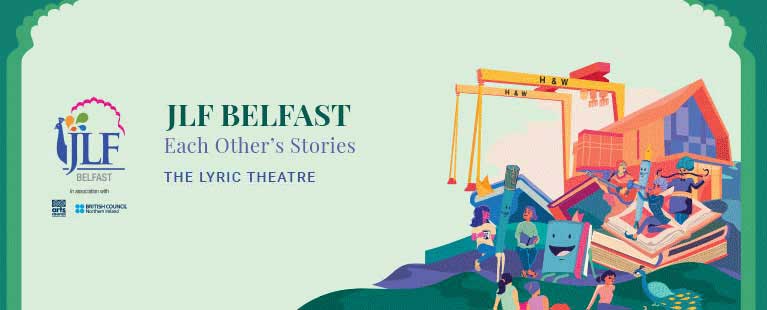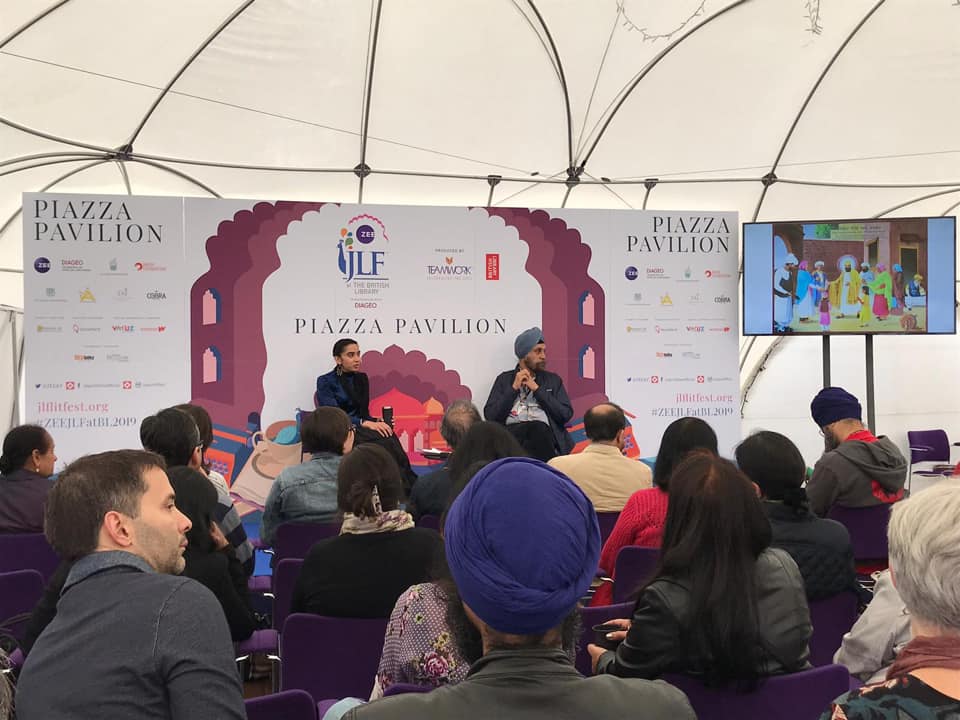


The Book of Nanak Navtej Sarna in conversation with Amrit Kaur Lohia
Despite the rainy start to Sunday sessions at the ZEE JLF at the British Library, the atmosphere inside the Piazza Pavilion was brightened by the vivid and rich descriptions and discussion of the travels of the poet and philosopher, Guru Nanak.
The writings and the travels of Guru Nanak, whose teachings are most associated with the founding of Sikhism, is the subject of Sarna’s new book, The Book of Nanak. In conversation with Lohia, Sarna discussed some of the historical, visual and literary sources which he drew upon in his book. The question of historical narrative was touched upon; however, for Sarna, while the historical record is important, it is Guru Nanak’s own writings which have been even more paramount as a part of the rich tapestry of sources in the novel. Touching on the subject of historical records and writing on the intellectual tradition of spiritual matters, as Lohia noted, there are some things that cannot be scientifically or historically rationalised, and yet we still try and intellectualise them.
Sarna spoke of Guru Nanak’s enlightenment, and his core message, “there is no Hindu and no Musliman, but [only] the equality of man.” Sarna noted that Nadak sets out on his journey to debate, enlighten and educate. His travels were odysseys across Asia, or as Sarna calls them, ‘journeys of detachment’. Nadak travelled east to Assam, south to Sri Lanka, to Tibet, Ladak and west to Mecca, Medina and Bagdad.
The humanisation of Nadak in order to gain a deeper understanding of his message was also discussed. Nanak’s travels portray him as a wandering dervish, who slept where he could, and ate what he could. For Sarna, the writing of and reading about the travels of Nadak, provide a humanising understanding through which you can access his philosophy and poetry. “One has to be as a Lotus flower in the water, one had to be part of the world… yet detached.” The importance of meditation is crucial.
For Sarna, it is some of the exchanges of Nadak that are key to understanding his works. Nanak’s travels were motivated by the idea of exchanges and debates, with Sufis, with priests, with people. Nadak travelled as a Haji to Mecca and Madina, and it is alleged that he was approached for disrespecting the House of God, lying resting with his feet to the Kabah. The tale goes, that Nadak asked, well. why don’t you turn my feet so that I am not facing God, importing the universality and omnipresence of God.
For Lornia, the context of the time, and the Bagdi poetry movement, which had some elements of a feminist movement, where many women also denounced some of the societal obligations placed upon them, also helps understand some of the writings of Nadak. Sarna notes that some of the poetry and writings of Nadak or writings at the time were also written from a female perspective, such as the idea of the worshipper in the form of a women waiting for her beloved, and her beloved is also God. Nanak's writing was taking place at the time when poetry and religion and worship were being democratised and could be understood by the ordinary farmer. Spirituality was being brought into the home. Religion returned to the people, away from being solely the domain of the priests.
For Sarna, the universalisation of Nanak's message is also key. Nanak’s world view had three key pillars: around the equality of man, the affirmation of this world, and how to ameliorate or alleviate human suffering. His teaching also took practical form, when he surrounded himself with a community of ordinary people, men, women, after his travels. His message was to work hard, meditate in God’s name and the importance of charity. For Nadak, sitting in a community and listening to God also had a social purpose, in a caste laden society. As Lohia, notes, in today’s world of more siloed communication, perhaps Guru Nanak's message of communication, discussion and exchange between communities has never been more relevant.


Leave a comment